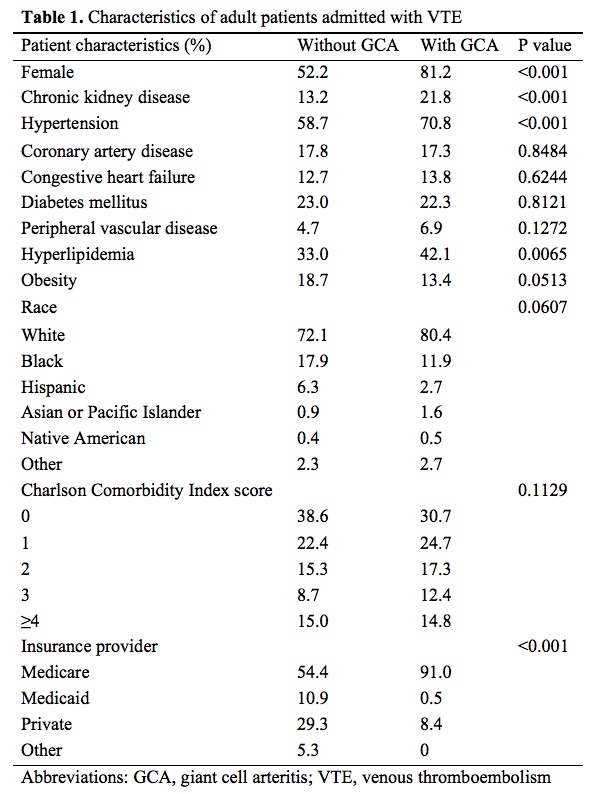Session Information
Date: Monday, November 9, 2020
Title: Vasculitis – Non-ANCA-Associated & Related Disorders Poster II
Session Type: Poster Session D
Session Time: 9:00AM-11:00AM
Background/Purpose: Giant cell arteritis (GCA) has been shown to have an increased risk of developing deep venous thrombosis (DVT), pulmonary embolism (PE) and combined thromboembolism (VTE) events in many studies. However, the impact of GCA on hospital stay outcomes in these patients with VTE including mortality, length of stay (LOS) and hospitalization cost is unknown. The aim of this study is to assess whether patients with GCA are experiencing more negative outcomes when compared with the general population during their in-hospital stay for VTE events utilizing the National Inpatient Sample (NIS) database.
Methods: We conducted a retrospective study on the association between GCA and VTE. Adult patients admitted with a principal diagnosis of DVT or PE were included. GCA patients were identified among these patients if they also carry a diagnosis of GCA on admission. We used data from the NIS database between the period of 2012 to 2014. We used the International Classification of Diseases, Ninth Revision, Clinical Modification/Procedure Coding System (ICD-9-CM) to identify co-morbid conditions and in-hospital complications. Multivariate regression analysis via STATA 16.0 was used to examine the association of in-hospital mortality, LOS and cost between GCA and non-GCA patients during their VTE admissions. A p-value of 0.05 was selected as the statistical significance threshold.
Results: We identified 897,180 admissions with VTE, among which 1,010 had GCA. Patients with GCA were older (mean age 78.5 vs. 62.5), more likely to be female (81.2% vs. 52.2%), have Medicare insurance (91.0% vs. 54.4%), chronic kidney disease (21.8% vs. 13.2%), hypertension (70.8% vs. 58.7%) and hyperlipidemia (42.1% vs. 33.0%). After adjustment of possible confounding variables within the patient and hospital level, there was no statistically significant difference in the in-hospital mortality, LOS, and cost of hospitalization when comparing GCA and non-GCA in VTE admissions (p = 0.752, 0.640, and 0.392, respectively).
Conclusion: GCA patients who were primarily hospitalized for VTE events do not have worse outcomes as compared to non-GCA patients in terms of mortality, LOS or cost of hospitalization. Future research will be warranted to investigate and confirm this finding.
To cite this abstract in AMA style:
Cao S, Bresnan C, Li S, Wang Y, Lin Y. Outcome of Giant Cell Arteritis Patients Who Were Primarily Admitted for Venous Thromboembolism Events [abstract]. Arthritis Rheumatol. 2020; 72 (suppl 10). https://acrabstracts.org/abstract/outcome-of-giant-cell-arteritis-patients-who-were-primarily-admitted-for-venous-thromboembolism-events/. Accessed .« Back to ACR Convergence 2020
ACR Meeting Abstracts - https://acrabstracts.org/abstract/outcome-of-giant-cell-arteritis-patients-who-were-primarily-admitted-for-venous-thromboembolism-events/

